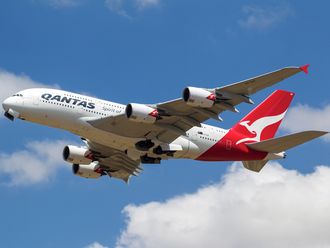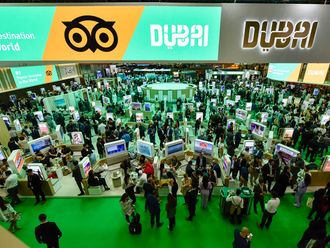Bad news often comes in threes, except for EADS. Three developments in three working days involving the world's second-largest aerospace group have been, respectively: positive but less so than it might seem; expectedly bad; and unexpectedly bad.
First, Friday night's deal with European governments to contribute an extra 3.5 billion euros (Dh17.46 billion) to Airbus' over-budget A400M military transport project. That saved the 20 billion-euro venture, but still forced EADS to take a 1.8 billion-euro charge for its share of the cost haemorrhages. And, as Evolution Securities notes, EADS remains on the hook for any further overruns hardly to be ruled out in a project this complex.
Monday brought the withdrawal of Northrop Grumman, EADS's partner, from the $50 billion race to provide refuelling tankers for the US Air Force. Without its US sponsor, EADS is unlikely to bid solo. That was a blow though one anticipated by the market, which had not factored in earnings from the project; after all, the US Department of Defence' terms clearly favoured Boeing.
Finally, EADS's earnings on Tuesday were the unexpected disappointment. The A400M provision, plus a further 240 million-euro charge on the A380 superjumbo, produced a surprisingly large 763 million-euro net loss, torpedoing the dividend. Worse was the 2010 outlook. Further cost pressures from the A380, plus the weak dollar and other currency effects, are expected to produce an operating profit of about 1 billion euros — half a billion less than the market had assumed.
That leaves EADS stock looking pricey indeed — even after Tuesday's 5 per cent share price fall. The group was previously trading on a demanding 16 times forecast 2010 earnings; factor in the reduced outlook and the multiple soars into the stratosphere. Nor is there much prospect of earnings rebounding in 2011. The share price may be commencing a long descent.
Puppy love
Puppy-love melts even the coldest heart. At least that is what pharmaceutical companies Merck and Sanofi-Aventis are betting on. The $16.5 billion merger of the companies' veterinary businesses will create the world leader in medical care for the family labrador. The union, though, is more than just a bet on high-margin canine heartworm pills. The combined entity will also become the top provider of livestock medications, a sector that accounts for three-fifths of the $19 billion global market for animal health care.
The merger is no surprise. After all, it was all but pre-negotiated last July. Merck, desperate to avoid the ire of competition regulators and to lock-in its $41 billion acquisition of Schering-Plough, offloaded its half share in Merial, its animal health joint venture, to partner Sanofi for $4 billion. As part of the deal, Sanofi also bought the option to merge Merial with Intervet, the veterinary business of Schering-Plough, now controlled by Merck. With the larger acquisition now out of the regulatory spotlight, the final pieces of the grand plan can be fixed together.
The benefits of fusing the two are clear. The combined entity will boast 30 per cent market share in animal health, half as much again as second-placed Pfizer. And the usual synergies in manufacturing, marketing and administration will also be eked out — perhaps as much as one-fifth of costs.
A complication, though, could come in the form of stick wielding anti-trust regulators. Pricing power will be a concern. So too product overlap. While Merck has more exposure to livestock and Sanofi leans towards pets, or "companion animals", both companies have significant interests in cattle and poultry vaccines, some of which may have to be jettisoned. Merck's chief executive Dick Clark may believe that the businesses "deserve to be together". Regulators are unlikely to entirely agree.
— Financial Times












